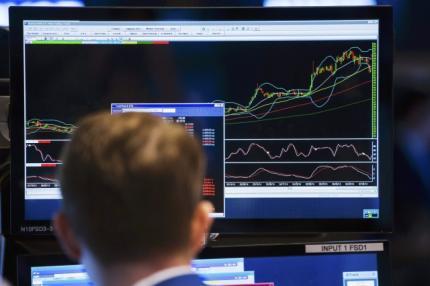Soft Data, Russia, Weigh on Europe; Bond Prices Up
Bareksa • 07 Aug 2014

A trader looks at his screen while working on the floor of the New York Stock Exchange shortly after the opening bell in New York. (REUTERS/Lucas Jackson)
The benchmark 10-year U.S. Treasury note was up 4/32, the yield at 2.469 percent.
Bareksa.com - European stocks fell on Wednesday as concerns over a Russian troop build-up on the border with Ukraine sent nervous investors into high-rated bonds, while U.S. stocks closed little changed to hold at support levels.
The S&P 500 is down 3.4 percent since its most recent record high on July 24, including a drop of nearly 1 percent on Tuesday on concerns of Russian escalation in Ukraine.
But the benchmark index has managed to hold around 1,920, a key technical support level, and also managed to bounce from its 100-day moving average, another support level.
"On the domestic side we're seeing markets that are see-sawing and still appearing to be assessing damage from volatility over the last few days. Everything seems to be taking a backseat to concerns in Russia and Ukraine right now," said Lawrence Glazer, managing partner at Mayflower Advisors in Boston.
The Dow Jones industrial average rose 13.87 points or 0.08 percent, to close at 16,443.34, the S&P 500 gained 0.03 point to 1,920.24 and the Nasdaq Composite added 2.22 points, or 0.05 percent, to 4,355.05.
NATO said on Wednesday that Russia has amassed around 20,000 combat-ready troops on Ukraine's eastern border and could use the pretext of a humanitarian or peace-keeping mission to invade.
The euro hit a nine-month low of $1.331 against the dollar amid threats of retaliatory Russian sanctions against the European Union and signs the crisis in Ukraine was affecting Germany, Europe's biggest economy. But it managed to bounce back and was up slightly at $1.3377.
German industrial orders slid in June at the steepest rate since September 2011, and the economy ministry said political tensions had probably led to more consumer caution.
The FTSEurofirst 300 closed down 0.8 percent while MSCI's world equity index dipped 0.3 percent. Dollar-traded Russian stocks stumbled 2.6 percent to end at the lowest level since May 6.
German 10-year bond yields were down 7 basis points at 1.104 percent after earlier hitting a record low of 1.096 percent.
Yields on lower-rated peripheral bonds rose, extending losses after data showed Italy, the bloc's third-largest economy, had unexpectedly slipped back into recession.
The ECB, which is due to meet on Thursday, has made unprecedented policy moves in recent months to try to keep the bloc's fragile recovery on track.
Portuguese bonds were the worst hit on Wednesday, their yields rising 10 bps to 3.79 percent. The country's main bourse dropped 4.1 percent to hit its lowest level since July 2013, with financial stocks suffering on concerns about fallout from a rescue plan for ailing Banco Espirito Santo.
The benchmark 10-year U.S. Treasury note was up 4/32, the yield at 2.469 percent.
'SABRE-RATTLING'
The European Union and the United States last week adopted tough new sanctions against Russia over its actions in Ukraine, marking a new phase in the biggest confrontation between Moscow and the West since the Cold War.
Russian Prime Minister Dmitry Medvedev threatened on Tuesday to retaliate for the grounding of a subsidiary of national airline Aeroflot because of EU sanctions, with a newspaper reporting that European flights to Asia over Siberia could be banned.
Risk aversion and improving U.S. economic data, which continued on Wednesday with a narrowing of the trade deficit, helped lift the dollar index as high as 81.716, an 11-month high against a basket of major currencies before it pared gains to 81.42.
Brent crude settled down 2 cents to $104.59 a barrel while U.S. crude settled down 46 cents at $96.92 after inventory data showed a smaller drop than announced in a separate report on Tuesday. (Source : Reuters)